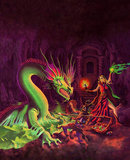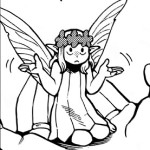|
Maxwell Lord posted:The kind of RPG is also a factor in all this- we're talking about D&D-alikes, and in D&D a potential consequence of an encounter is a TPK. Game over, everyone loses except maybe the GM if you're a sicko. Thus the consequence of an unbalanced encounter is much greater than in, say, the kind of superhero game where a team can get the crap beaten out of them but recover and rally to defeat the bad guy later.
|
|
|
|

|
| # ? May 26, 2024 05:32 |
|
Arivia posted:Yeah Iím not arguing that itís perfect just that in 3e it didnít need to tell you whether the creature was meant to be used in groups or not because the system had other info for that in the same stat block. 3E: attempts to formalise the ad-hoc mechanics of previous editions into something universal and rigorous. Dogged by bad math, inconsistent application, and fundamental misunderstandings of how their own game works, but a solid framework with noble goals. 4E: iterates on 3E's system by taking what works and further formalising it in the context if a better understood system. A very good mechanic. 5E: completely ignores 4E in favour of iterating on a weird version of 3E that never actually existed. The result in no way fits the system it's written for. Relies heavily on "GM Empowerment!!!" to handwave away its flaws. Just hot garbage for no good reason. Splicer fucked around with this message at 09:59 on Aug 15, 2022 |
|
|
|
CitizenKeen posted:Are you me? 
|
|
|
|
Colonel Cool posted:I could never get excited about Dungeon World. It's always seemed solidly mediocre every time I tried it. Agreed, and having also tried Monster of the Week. I've concluded I just don't like the Powered by the Apocalypse system.
|
|
|
|
Agents are GO! posted:Yes, only approved folks should be able to create D&D material. Arivia posted:Frankly this thread right now is being more of a gatekeeping grog hive than the windmills itís tilting at.
|
|
|
|
Deptfordx posted:Agreed, and having also tried Monster of the Week. I've concluded I just don't like the Powered by the Apocalypse system. It's certainly very possible, but I'll also suggest that both of those were made pretty early in the PbtA cycle when people didn't really understand the technology very well. There might be some more modern PbtA games that work better for you just by virtue of being better designed.
|
|
|
|
Xiahou Dun posted:Don't let the rules boss you around, hoss. Ars Magica de Spell
|
|
|
|
Deptfordx posted:Agreed, and having also tried Monster of the Week. I've concluded I just don't like the Powered by the Apocalypse system.
|
|
|
|
OtspIII posted:Fair, and there are definitely a bunch of older monster design abilities I'd be glad to see never come back, like stat drain. The thing is, these more narrative twists players can use to grab an advantage in a fight are usually better when they're not the types of things you put in a statblock--they're situational, playing off the monster's placement in the larger story going on and facts pre-established in the scene or whatever. Which makes them awkward to cite in the abstract, but also actually pretty common and natural in actual play with groups that are into that kind of thing? I have a response to this, but it's going to be a bit of a journey. I'm a real Mage: The Awakening nerd, and one of the rules changes in MtAw 2e that I appreciate the most is simple: the amount of damage a spell can do is limited based on how many points you have in that type of magic. That doesn't sound like a big deal, but mages can do pretty much anything if you're creative enough and previous editions didn't have that kind of rule. So, there's nothing stopping players who feel clever from taking a brand new chemist-mage and going "I turn the air around his head into FOOF, that should be good for 5 Aggravated damage". That kind of thing's interesting once. If it ever comes up a second time, the entire game is going to fall apart completely, because the whole concept of the combat system has been destroyed and everything is devolving into rocket tag. My point is, RPGs need to allow players to do weird poo poo. Whether that means mages casting weird spells or GMs making unique monsters to freak out their players, games are only improved by explicitly giving people the opportunity. However, when you're dealing with a complicated subsystem (which combat is in most RPGs), you need to give people hard guidelines for what that weird poo poo should actually be capable of mechanically in that subsystem or the game is going to fall apart. (I say 'guidelines' instead of 'rules' because there's no way to stop a group from making an informed decision to break a rule for the sake of doing something cool. As long as those guidelines are there and everyone knows what they're doing, it's fine.)
|
|
|
|
I've always felt this is where metacurrency shines. When someone wants to do some "this is going to break things if it's repeatable" stuff your say "yes, if your spend an X", then you make it work real good + the usual benefits for spending but everyone is now thinking about it in the mental context of the character pulling some special situational nonsense that explicitly will not work again consistently, if at all.
Splicer fucked around with this message at 16:13 on Aug 15, 2022 |
|
|
|
Strike has a "cool the first time" rule where if you have a good idea (I dunno, blow up a fire hydrant next to a fire elemental to douse it) it's extra effective, but if you do the same thing again it's just a baseline attack
|
|
|
|
CitizenKeen posted:Are you me? It also has a really good monster manual in the 13th Age Bestiary. I'll do an F&F of it soon, but it's got a bunch of classic D&D monster types with many ways to adapt them to your style of play, all with several campaign hooks beyond just random encounters. I counted about 275 adventure hooks over 40 entries when I did a review for a now-defunct RPG blog. There are a few entries with unnecessary gender issues, but those have easy fixes. Basically, if you want to put the spotlight on a classic D&D monster, this is your book.
|
|
|
|
Halloween Jack posted:When did "gatekeeping" become the weasel word du jour? I have no power to stop anyone from playing lousy games. People are allowed to criticize stuff you like; it's not a form of oppression. So it's been a meaningless word w/r/t gaming for a while. e: correction FMguru fucked around with this message at 18:07 on Aug 15, 2022 |
|
|
|
Bottom Liner posted:I also don't buy the argument that improving one aspect of the game inherently harms the others. The general combat math can be balanced without affecting how much your table plays narratively. There's stuff that does and doesn't harm the other parts of the game. If the giant crab has stats that are wildly inappropriate for their CR, adjusting their CR does only good things. If you decide you don't want swingy fights and remove all abilities/rules that can create huge wild swings, combat gets less chaotic (good for people of some tastes, bad for others). If you realize that combat being less swingy means you need to remove most of your attrition mechanics and make sure the PCs start every fight at full power in order for CR to stay meaningful, you're wandering towards a design where the PCs getting an advantage you didn't anticipate turns fights into a trivial slog to resolve. If you pick a playstyle and optimize for it, eventually it stops being as good for other playstyles. And by narrative in this context I mean 'using the scene as described to get an advantage in the fight', not storytelling. gradenko_2000 posted:if your game lacks a lot of discrete mechanics (say, OSR D&D), then a Thief/Rogue player-character making a Stealth check to gain advantage can only have so many possible results This is kind of to the heart of the point I'm trying to make--this is all only true if the only outcome expected is a straightforward fight. Other outcomes might be something like. . . --The thief successfully grabs the map unseen and runs back to the party with it --The thief gets caught and now the fight's about distracting the ogre enough that they don't get murdered --The thief gets the map and then gets seen, and now the fight is more of a chase as everyone runs away --The thief bars the door the reinforcements were going to come from, buying 1d4 turns of crowd-control as they bash the door down --The thief opens the pit trap, so that when the fighter rushes into the room they can push one of the orcs into it with their initial charge, taking them out of the fight --The thief lights a bunch of important documents on fire, forcing some of the enemies to spend their times putting them out and taking pressure off everyone else There are editions I wouldn't do anything like that in, because it would just make the fight too easy while still making it take a long time to play out, but there are also some editions where finding stuff to do like that is as fun or more fun than the chess side of tactical combat. Maxwell Lord posted:The kind of RPG is also a factor in all this- we're talking about D&D-alikes, and in D&D a potential consequence of an encounter is a TPK. Game over, everyone loses except maybe the GM if you're a sicko. Thus the consequence of an unbalanced encounter is much greater than in, say, the kind of superhero game where a team can get the crap beaten out of them but recover and rally to defeat the bad guy later. Oh yeah, I think this is a really important point. A lot of all this is just coming from the base assumptions of Trad play that. . . A) The players get into lots of fights B) If they ever lose a fight the entire campaign implodes C) Every fight should be tense and close E) Fights should last long enough for every character to get to use their cool skills D) Many of the fights can't be skipped or sidestepped That's a real ugly set of design constraints, and puts incredible pressure on things like CR to be accurate. I think you'd find that in games that have less of those constraints (say, something more about traditional dungeon crawling), that a lot of what we're talking about here just isn't that important any more. Gort posted:Strike has a "cool the first time" rule where if you have a good idea (I dunno, blow up a fire hydrant next to a fire elemental to douse it) it's extra effective, but if you do the same thing again it's just a baseline attack Yeah, there's a huge amount of context and skill that it takes to make good rulings on things like this, but in my mind the key to good improvisations is that they need to key off of stuff already laid out in the narrative. If the GM unwittingly drew some fire hydrants on the map as they set up the encounter, let every one of those have full effect. You usually aren't fighting fire elementals on a city block, so just reward them for the good idea for this fight--it's not going to carry over into other scenarios. What isn't worth rewarding is stuff that's just spammable--"I throw sand in their eyes" type stuff that the player can just do in every fight for the rest of the campaign.
|
|
|
|
It's also used when anyone says no. Imagine you're playing poker and I'd rather we play blackjack. Stop telling me how to have fun, that's gate keeping.
|
|
|
|
Halloween Jack posted:When did "gatekeeping" become the weasel word du jour? I have no power to stop anyone from playing lousy games. People are allowed to criticize stuff you like; it's not a form of oppression. Saying that some peopleís gaming is less than yours and decrying it as stupid is the definition of gatekeeping.
|
|
|
|
Arivia posted:Saying that some peopleís gaming is less than yours and decrying it as stupid is the definition of gatekeeping. did anyone actually say this or are you just fighting enemies imagined, also what is your made up guys CR cause I just said I don't think d&d is good because edition wars are tiring and using sales to back up edition wars is doubly tiring.
|
|
|
|
ItohRespectArmy posted:did anyone actually say this or are you just fighting enemies imagined, also what is your made up guys CR Someone coming up to you and going "if you had better taste you wouldn't be playing that game you enjoy" (like has been said in the last 24h in here) is a classic example of groggy gatekeeping. Like, hate on 5e, but the amount of contempt for the players in here is staggering.
|
|
|
|
Gort posted:Strike has a "cool the first time" rule where if you have a good idea (I dunno, blow up a fire hydrant next to a fire elemental to douse it) it's extra effective, but if you do the same thing again it's just a baseline attack Also relevant to the current discussion, in addition to its normal CR system and monster creation rules, there's a subtype of monsters called "Unfair Monsters" that explicitly fall outside that system and are reserved for things like Actual Literal Dracula who require a specific prep to fight successfully or have abilities that can't be easily qualified. I don't see why DnD couldn't just have a normal balanced CR for 80% of monsters and then a separate list for iconic weird stuff with notes about how to utilize them.
|
|
|
|
Arivia posted:Someone coming up to you and going "if you had better taste you wouldn't be playing that game you enjoy" (like has been said in the last 24h in here) is a classic example of groggy gatekeeping. Like, hate on 5e, but the amount of contempt for the players in here is staggering. Nobody said that.
|
|
|
|
Countblanc posted:Also relevant to the current discussion, in addition to its normal CR system and monster creation rules, there's a subtype of monsters called "Unfair Monsters" that explicitly fall outside that system and are reserved for things like Actual Literal Dracula who require a specific prep to fight successfully or have abilities that can't be easily qualified. I don't see why DnD couldn't just have a normal balanced CR for 80% of monsters and then a separate list for iconic weird stuff with notes about how to utilize them. Yeah like just put asterisks on your medusae and vampires and such, this would be very easy for 5e to do and even in tradition.
|
|
|
|
Arivia posted:Someone coming up to you and going "if you had better taste you wouldn't be playing that game you enjoy" (like has been said in the last 24h in here) is a classic example of groggy gatekeeping. Like, hate on 5e, but the amount of contempt for the players in here is staggering. nobody said this and people saying that 5e isn't perfect shouldn't upset you this much, I would probably look into why mild criticism of a roleplaying game has such a emotional effect on you if I were you.
|
|
|
|
Arivia posted:Like, hate on 5e, but the amount of contempt for the players in here is staggering. quote it or stop tilting against windmills
|
|
|
|
moths posted:Nobody said that. moths posted:If they cared about better games, they wouldn't be playing D&D. You said it yourself.
|
|
|
|
Arivia posted:You said it yourself. ok, now go quote where people said it was stupid and you were "subhuman" for liking it lol
|
|
|
|
It's okay. Arivia and I are the product of a secret experiment to produce two people with precisely opposite taste in roleplaying games. I'm just fortunate to be the one that likes good games and not bad ones, though I do like some bad ones sometimes. That's not what the word "gatekeeping" means, though. Like I said, I have no power to control anyone's ability to read, play, and/or discuss lousy roleplaying games.
|
|
|
|
Arivia posted:You said it yourself. I don't call your inability to parse context gatekeeping. moths posted:Prioritizing "Is this game well-crafted?" below "What is my group / favorite streamer playing?" doesn't make you some kind of doofus, it makes you a D&D player. Maybe all these Olive Garden patrons aren't concerned about authenticity. Is that calling them stupid idiots who don't know how to eat food?
|
|
|
|
The elephant in the room when it comes to setting combat ratings is that you can't control the difficulty of an encounter from a design perspective if you can't predict a constrained range of capacity of the player characters; and in most editions of D&D, with 4th a notable exception, the spellbook options of the casters are effectively an unconstrained range of capacity. Even a fairly low-level party might have a very easy time or a very rough time with a group of mooks depending entirely on whether the wizard knows and can cast Sleep in this fight. If you tried to build a CR-calculation decision tree in which you took into account what's in the party's spellbook and whether they've used up or not used up the most encounter-impactful spells, you'd need a supercomputer. Even if you removed all of the swingy enemy abilities from the game (stuff like being ethereal, or having level drain, or save-or-suck/save-or-die abilities/spell-like abilities), you'd still be hard up against the spells problem. You can't just calculate DPS, net defense, net hit points, and average number of heals available and spit out a number, if one member of the party might or might not be able to teleport/mind control an enemy/turn into a dinosaur/summon the angelic hordes. Since D&D leverages its kitchen sink magic system into other parts of the game, including magic items and monster abilities, the problem is compounded. The load is on the GM to balance the encounter based on specific knowledge, because the GM has to take into account the rogue's Ring of Underwater Breathing and the wizard's lack of any fire magic that totally re-shapes what the shipborne encounter with the Hugh the Hydromancer could be like. CR being variably worthless isn't a deal-killer obviously, lots of tables still manage somehow to play D&D. I guess my point is, it's built in to most editions of D&D that CR could never have been made to work no matter how much effort was put into it. Even if you completely ignore the element of narrative creativity at the table (the classic example is the chandelier swing), you can't calculate out an intrinsically balanced encounter for a game that hasn't got intrinsically constrained character/npc/monster capacities.
|
|
|
|
ItohRespectArmy posted:ok, now go quote where people said it was stupid and you were "subhuman" for liking it lol Denigrating a thing someone likes while claiming it's not about the person is, really, a pretty common way to denigrate the person while claiming you Totally Aren't, Honest, It's Just Too Bad They Have Such Objectively Bad Taste. Arivia's taking it a little too personally but it's also extremely understandable especially given how thinly-veiled it sometimes feels on these forums. Even if you don't actually mean it that way, it comes pretty drat close in on the same language of dismissing people through the stuff they enjoy.
|
|
|
|
disposablewords posted:Denigrating a thing someone likes while claiming it's not about the person is, really, a pretty common way to denigrate the person while claiming you Totally Aren't, Honest, It's Just Too Bad They Have Such Objectively Bad Taste. Arivia's taking it a little too personally but it's also extremely understandable especially given how thinly-veiled it sometimes feels on these forums. Even if you don't actually mean it that way, it comes pretty drat close in on the same language of dismissing people through the stuff they enjoy. On the other hand, you aren't what you consume. It's bad practice to identify and emotionally attach with brands to a degree where you take criticism of one personally.
|
|
|
|
OtspIII posted:There's stuff that does and doesn't harm the other parts of the game. If the giant crab has stats that are wildly inappropriate for their CR, adjusting their CR does only good things. If you decide you don't want swingy fights and remove all abilities/rules that can create huge wild swings, combat gets less chaotic (good for people of some tastes, bad for others). If you realize that combat being less swingy means you need to remove most of your attrition mechanics and make sure the PCs start every fight at full power in order for CR to stay meaningful OtspIII posted:Yeah, there's a huge amount of context and skill that it takes to make good rulings on things like this, but in my mind the key to good improvisations is that they need to key off of stuff already laid out in the narrative. If the GM unwittingly drew some fire hydrants on the map as they set up the encounter, let every one of those have full effect. You usually aren't fighting fire elementals on a city block, so just reward them for the good idea for this fight--it's not going to carry over into other scenarios. What isn't worth rewarding is stuff that's just spammable--"I throw sand in their eyes" type stuff that the player can just do in every fight for the rest of the campaign. On a less fuzzy but still somewhat meta note 4E's page 42 ramped up the damage if the improvised attack consumed part of the scenery. Hitting someone with a barrel or breaking a barrel over someone's head when there's an effectively infinite amount of barrels does less damage than hitting someone with the only barrel in the room.
|
|
|
|
OK I was typing while this latest slapfight developed so my apologies for not jumping on it immediately. It's OK and fine for people to play D&D, they are not stupid for it, and everyone in here who implied that unintentionally is very sorry. moths posted:On the other hand, you aren't what you consume. It's bad practice to identify and emotionally attach with brands to a degree where you take criticism of one personally. There's lots of people here who play D&D and they don't actually really think anyone else is subhuman for doing so. Many of us are just frustrated because we think D&D could be a better game than it is, today, or at least wish is was. Others have entirely given up on it but have strong opinions leftover from extended contact with the game and it's hard not to go ahead and express them when the conversation is in progress. For discussion in TG to function, people have to be allowed to be honest about how they feel about various games. Maybe at times we're not careful enough to acknowledge that other people like those games and play them and we're not judging them for it. Probably there's a handful of people here who are judging, but it's difficult for mods to parse one from the other and somehow ban what's being loosely called "gatekeeping" without applying a deep chilling effect on discussing the shortcomings and problems of various games and editions of games past and present. Nevertheless, we all always have the option to be considerate of who else is in the metaphorical room and as a moderator I'd appreciate it if posters made more of an attempt to do that as a matter of course. Good enough? Yes? We can choose collectively to drop it now? Leperflesh fucked around with this message at 18:54 on Aug 15, 2022 |
|
|
|
Arivia posted:Saying that some peopleís gaming is less than yours and decrying it as stupid is the definition of gatekeeping. Nobody's saying that. Nobody in this thread wants their RPGs to be exclusive and elite - I think I can speak for everyone when I say they wish their favorite games were more popular. We're trying to open the gates, not close them. One of two things is true, Arivia:
[1] Acknowledging that quality of design is not an objective binary but a subjective spectrum. Saying D&D is a bad game (that 1 is false) is not gate keeping. I've played 5th Edition. It's a lovely game. And I'll probably play it again. Because there are other factors in D&D 5th favor other than design. Last time I played 5th, some of the people at my table didn't know any better. They were ignorant. That's not a judgment - if they haven't played anything but D&D, they are ignorant. Some of the players didn't care - they were there for beer and pretzels and camaraderie and that's it; as long as the game didn't get in the way they just didn't care whether it was good or bad. And some of us knew it was bad, and cared, but really wanted to see that group of people. D&D 5th is a bad system. That's not gatekeeping. Splicer posted:I've always felt this is where metacurrency shines. When someone wants to do some "this is going to break things if it's repeatable" stuff your say "yes, if your spend an X", then you make it work real good + the usual benefits for spending but everyone is now thinking about it in the mental context of the character pulling some special situational nonsense that explicitly will not work again consistently, if at all. mllaneza posted:It also has a really good monster manual in the 13th Age Bestiary. I'll do an F&F of it soon, but it's got a bunch of classic D&D monster types with many ways to adapt them to your style of play, all with several campaign hooks beyond just random encounters. I counted about 275 adventure hooks over 40 entries when I did a review for a now-defunct RPG blog. There are a few entries with unnecessary gender issues, but those have easy fixes. Basically, if you want to put the spotlight on a classic D&D monster, this is your book. I think it's kind of fitting. 13th Age was a game designed to be D&D as it is played, and as such is better than D&D. It was optimized for how (many, not all) players actually play D&D, and as such, the 13th Age ecosystem is better because it's optimized for how 13th Age is actually played. The Bestiaries are top notch. Aformentioned Eyes of the Stone Thief is just <chef kiss/>. Book of Devils, Book of Ages, etc. All filled with good ideas. A lot of RPGs have some tables with "GM ideas", that are always one or two lines. "17: Goblins are actually made of rocks." And that's okay, I can work with that. But 13th Age books are always filled with paragraph entries, listing the first order implications, so you as a GM can start noodling on second order implications. Asking a prospective player to grab a dozen books to get up to speed on 13th Age "as it is played" is too much, though. A second edition would be nice to codify a lot of these things.
|
|
|
|
disposablewords posted:Denigrating a thing someone likes while claiming it's not about the person is, really, a pretty common way to denigrate the person while claiming you Totally Aren't, Honest, It's Just Too Bad They Have Such Objectively Bad Taste. Arivia's taking it a little too personally but it's also extremely understandable especially given how thinly-veiled it sometimes feels on these forums. Even if you don't actually mean it that way, it comes pretty drat close in on the same language of dismissing people through the stuff they enjoy. That's pretty fair, my original post was meant as joke that essentially boiled down to "there's no need for edition wars because D&D itself is a flawed system in every edition" which probably read alot harsher than I was attempting to put out there. Leperflesh posted:
I will also take a "my bad" on this front and try to be less harsh in future and the rest of your post basically sums up what I was going to say in the rest of this post w/r/t people enjoying d&d
|
|
|
|
Leperflesh posted:The elephant in the room when it comes to setting combat ratings is that you can't control the difficulty of an encounter from a design perspective if you can't predict a constrained range of capacity of the player characters; and in most editions of D&D, with 4th a notable exception, the spellbook options of the casters are effectively an unconstrained range of capacity. Even a fairly low-level party might have a very easy time or a very rough time with a group of mooks depending entirely on whether the wizard knows and can cast Sleep in this fight. If you tried to build a CR-calculation decision tree in which you took into account what's in the party's spellbook and whether they've used up or not used up the most encounter-impactful spells, you'd need a supercomputer. 1) Calculate hero consumption based on the refresh timer rather than per-fight. Players can handle X points of fight per refresh timer (and a fight with double enemies obviously counts as more than double the points). So if the wizard doesn't have sleep for fight 3 because they spent it on fight 2 that's OK, because it's not about them ending each fight nearly dead, it's about them ending the last fight nearly dead, and it's up to them if they want to start it nearly dead but full of spells or fit as a fiddle wielding broken sticks and once-off consumables. It's not "This is a HARD fight, end of sentence" it's "This is a HARD fight, which means they will consume 50% of their consumables" (HP and HP restoration counts as consumables). This is how 4E worked and 3E theoretically worked. 2) Firmly silo off combat-oriented spells from non-combat, and be very open minded on what counts as "combat". Teleport is a combat spell. Mending is not*. *gimmick enemies that are weak to specific non-combat spells are a different kettle of fish and just fine. Splicer fucked around with this message at 19:10 on Aug 15, 2022 |
|
|
|
I can only speak for myself, but I only hold actual contempt for Mike Mearls and whoever else is responsible for D&D marketing, and I think a lot of other people ITT feel the same way. He did more to gatekeep the hobby than anyone here, and he was incredibly lucky that his brand was promoted by other people with a much better sense of how to engage new people and casual players.Kai Tave posted:Okay but the thing is I don't really want that in a tactical combat game, sorry. I don't sit down to play XCOM and then go "man I wish a bunch of stuff that wasn't tactical combat suddenly happened in the middle of this fight," and D&D combat frankly has a lot more in common with XCOM than it does with a rousing game of tricksy cleverness, which is why everything is built around tactical maps with 5-foot grid spaces and you have the precise measurements for fireballs and opportunity attacks. If I want poo poo like "talk the enemies into fighting each other to end the fight early" then I would frankly rather play a different game than D&D, one that better supports such a thing without being as arbitrary about it. OtspIII posted:But, like, that is D&D. That's the thing that made D&D stand out from what came before it. The slide back into tactical combat game came over time, intensifying with 3E and hitting its stride with 4E. The mix of improvisational and tactical strategizing has always been there, and hard favoring the tactical is a (relatively) recent development. What does get in the way is the assumption that the game is built around set-piece encounters and that encounters take a long time to play out. If bypassing a combat encounter blows an hour-shaped hole in what you planned to be a four-hour session, that's a problem. This is why, considering games in the D&D genre, I look for with games that have more tactical depth than B/X but are less complex and more fast-playing than 4e.
|
|
|
|
Maxwell Lord posted:The kind of RPG is also a factor in all this- we're talking about D&D-alikes, and in D&D a potential consequence of an encounter is a TPK. Game over, everyone loses except maybe the GM if you're a sicko. Thus the consequence of an unbalanced encounter is much greater than in, say, the kind of superhero game where a team can get the crap beaten out of them but recover and rally to defeat the bad guy later. Even back in the old, old, old (old) days, losing a fight badly didn't automatically result in TPK / everyone dead, campaign over. It was far more likely to result in something like everyone being captured by the bad guys and having to figure out a way to escape.
|
|
|
|
Kai Tave posted:Okay but the thing is I don't really want that in a tactical combat game, sorry. I don't sit down to play XCOM and then go "man I wish a bunch of stuff that wasn't tactical combat suddenly happened in the middle of this fight," and D&D combat frankly has a lot more in common with XCOM than it does with a rousing game of tricksy cleverness, which is why everything is built around tactical maps with 5-foot grid spaces and you have the precise measurements for fireballs and opportunity attacks. If I want poo poo like "talk the enemies into fighting each other to end the fight early" then I would frankly rather play a different game than D&D, one that better supports such a thing without being as arbitrary about it. You may like Pathfinder 2e in this regard, which puts a fairly hard line between "exploration mode" and "encounter mode", where the former is the time for fairly loosey-goosey improvisational exploration and interaction stuff and the latter is the crunchy tactical combat, complete with cover bonuses actually mattering for once because the math is very tight. Rather than the 4e-style improvised damage table, it tries to lean hard into interaction (by both PCs and monsters) with hazards that are explicitly on the map: triggering traps that go off in a different square, pushing enemies into pits, squares that have something in them that causes damage when you pass through, etc.
|
|
|
|
Roadie posted:You may like Pathfinder 2e in this regard, which puts a fairly hard line between "exploration mode" and "encounter mode", where the former is the time for fairly loosey-goosey improvisational exploration and interaction stuff and the latter is the crunchy tactical combat, complete with cover bonuses actually mattering for once because the math is very tight. Rather than the 4e-style improvised damage table, it tries to lean hard into interaction (by both PCs and monsters) with hazards that are explicitly on the map: triggering traps that go off in a different square, pushing enemies into pits, squares that have something in them that causes damage when you pass through, etc. Pathfinder 2e still mixes in and out of combat resources though (especially for spell choices and skill feats), and frankly one of the things I wish the system did define a bit better was the damage for environmental effects. Table 10-11's environmental damage ranges are surprisingly crappy next to how other effects are created like hazards and monster damage.
|
|
|
|

|
| # ? May 26, 2024 05:32 |
|
Deptfordx posted:Agreed, and having also tried Monster of the Week. I've concluded I just don't like the Powered by the Apocalypse system.
|
|
|


































